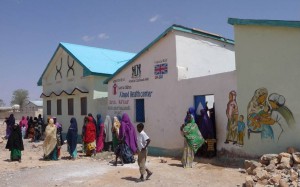6th December 2013 Mogadishu, Somalia
Empowering women to take control
As part of our support to the 16 days of activism campaign, I have invited some our partners to share their stories.
The Health Consortium is made up of a partnership between health authorities and Population Services International (PSI), Tropical Health Education Trust (THET), Health Poverty Action, Save the Children UK, and Trocaire. From 2010 – 2015 £37.6million of UKaid will be provided to the Health Consortium to strengthen the health system through increasing skilled human resources, building the capacity of health authorities and facilitating a joined up approach to district level service delivery.
Empowering women to take control
Being male or female makes a fundamental difference to people’s lives and life-chances. Life-chances are all determined by gender. A girl and a boy in Somalia will have different chances of living to old age, of learning to read or of holding public office – to name but three. Other factors such as poverty, displacement, age or ethnicity intersect with gender.
Female genital cutting is commonplace in Somalia, where 98% of Somali women have undergone the practice, most of them in its most severe form. This is a form of violence against women, and one of the most extreme manifestations of discrimination against girls and women. The impact on women’s and girls’ whole lives can be devastating.
It has been difficult to talk about gender issues in Somalia. Most women don’t have channels to discuss issues affecting them. The Health Consortium for the Somali People (HCS), supported by UKaid, is creating a platform for discussion on different forms of violence against women, whether physical or psychological.

Through the programme, we are targeting over 200,000 women with behaviour change communications including female genital cutting through TV spots, radio and local drama raising awareness of the consequences of this brutal practice and where support is available. The programme includes building the capacity of health workers, including a module on the prevention of female genital cutting. The workers also learn how to identify and refer women suffering harmful consequences of cutting.
In Sahil region, there are girls clubs in schools to promote SGBV prevention and the girls then share that information amongst the boys. This gives the girls a chance to come together and discuss topics that affect them. Again in Sahil, there is an SGBV forum that consists of representatives from police, judicial system, hospital, community elders, religious elders and they travel around the region referring cases to the judicial system for prosecution and awareness.
In Somaliland pharmacy providers are trained to provide female friendly services, such as family planning, birth spacing and counselling. Women are represented in training of health workers and staff recruitment brings a gender balance. In South Central, more women are encouraged to be represented on the district health boards.
Whilst reducing violence is a long way off, women have much larger representation nowadays and are active in change. We are seeing more women in key government positions who are advocating for gender balance and involvement of women in decision making.
For so many women, the world we live in today is one of opportunity; we believe that should be the case for all girls and women.
The Health Consortium for the Somali People